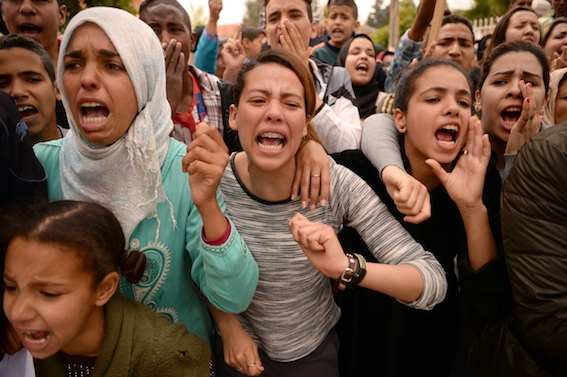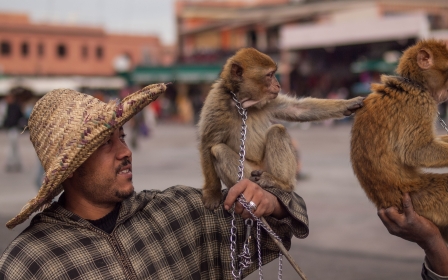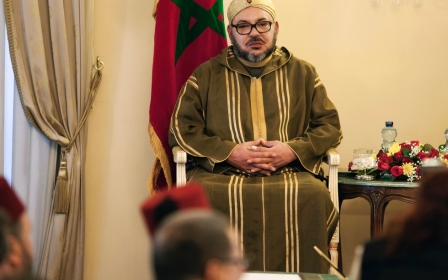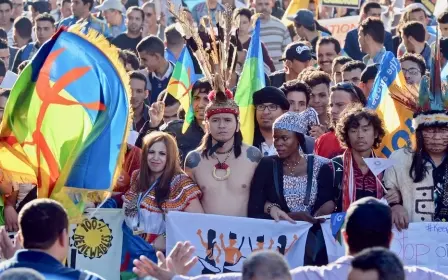Homosexuality in Morocco: Girls’ trial sparks debate on decriminalisation

CASABLANCA, Morocco - Two girls seen kissing on a rooftop will go before a judge on Friday in Marrakech. Reported to police by a relative and arrested on 27 October, Sanae and Hajar, 16 and 17 years of age, are being prosecuted for homosexuality and face six months to three years in prison, according to article 489 of the Criminal Code, which provides that "anyone committing an indecent or unnatural act with an individual of the same sex" shall be punished.
"They were incarcerated for almost a week and released in November, just before the commencement of the trial, even though they are minors," said Omar Arbib, from the Marrakech branch of the Moroccan Association for Human Rights (AMDH).
Hajar spent time in prison, under harsh conditions and surrounded by adults who knew of her alleged sexual orientation, according to the collective Akaliyat, which campaigns for the rights of sexual and religious minorities, and is seeking recognition as an official association.
According to Arbib, the two girls deny being gay and their families say they had never noticed any "signs of homosexuality".
According to one of their lawyers, AMDH activist Moulay Rachid El Ghorfi, the case is "empty" and there is no physical or other evidence. Beyond the case, he calls for the respect of individual freedoms and advocates that article 489 be repealed.
This is the first time, according to Arbib, that a case of female homosexuality has been brought to court. "We demand the annulment of the case and that article 489 of the Criminal Code be repealed," he said.
85,000 signatures collected
Collectives ASWAT and Akaliyat have begun collecting signatures to free the two girls, with 85,000 so far, which may be a significant number considering the sensitive topic amid Morocco's conservative culture. In spite of the arrests getting media play, there are few voices actually demanding that homosexuality be decriminalised.
Among them are MALI (Alternative Movement for Individual Freedoms) and AMDH. Thanks to social media, stories involving homosexuality are receiving more coverage and more people are coming out as gay in Morocco. According to decriminalisation advocates, the article 489 contradicts the Constitution enacted in 2011 and also international agreements signed by Morocco.
"This fight for the decriminalisation of homosexuality and in favour of sexual liberty in general is a long uphill struggle that has just started," said Ibtissam Betty Lachgar, co-founder of MALI.
‘Your laws will never stop our love’: poster of MALI
Last March, the decriminalisation of homosexuality made the front pages when two gay men were beaten up in Beni Mellal. They were incarcerated after being beaten and dragged naked through the streets by people who were then supported by the population of Beni Mellal when they were put on trial.
The two men received suspended sentences, a relative victory.
Not a priority
No political parties called for decriminalising homosexuality. Only the UC (Constitutional Union party) released a statement about the beating case, and it was only critical of the home invasion involved, mentioning nothing about the beating of two men because of their sexual orientation.
For the LGBT activists, the silence is especially disappointing from Morocco's left-wing parties, which claim to be defenders of human rights.
Driss Lachgar, general secretary of the USFP (Socialist Union of Popular Forces), said the fight to make homosexuality legal is not a priority for party leaders. He said during a recent conference, shortly after the Beni Mellal case, that "this is not one of the party’s priorities, for talking about freedom is not that narrow".
"Political parties remain timid when it comes to decisions about these sensitive topics. For instance, MALI, a universalist and secular movement, is viewed as being "Westernised". Even though human rights and women's rights are universal, aren’t they?" said Ibtissam Betty Lachgar.
She added: "The fight against obscurantism, religious extremism and patriarchy is an emergency in a country like Morocco. We cannot lose ground, and MALI is doing a good job because human rights cannot wait, neither can victims of freedom-destroying laws and backward mentalities."
In Casablanca, 23 cases
There is no official number of how many alleged homosexual people have been arrested throughout the country. But between last March and July, there were 23 cases in Casablanca alone, according to human rights associations. "Arrests, police questionings and imprisonment are far from being non-violent and are being carried out under harsh conditions," Lachgar said.
The LGBT community counts many victims of harassment and verbal or physical abuse. Within an ultra-conservative society, where religion rules, social status means everything and being gay is a crime, often the aggressors feel it is their role to maintain moral standards within the culture.
Victims seldom press charges because they may be the ones who end up in the prisoner's dock. Last year in Fes, a man who "looked homosexual" was beaten by people in the streets. Video footage of him being beaten shocked Morocco. The MALI association says the state itself is homophobic and justifies the aggressive behaviours.
"The situation for the LGBT community is horrifying," said Ismael Bakkar, a MALI activist. "There’re two types of homophobia: the public's opinion and the state’s. In order to live as safely as they can, many gays are staying off radar. Every day, they have to hide who they are."
Ahmed* rarely emerges from his parents’ house, since he has been cornered and beaten by the people of his neighbourhood, once leaving him with a broken arm. "I was on my way home one night when I noticed that young guys from my neighbourhood were waiting for me," he said. "They called me an atheist and homosexual, they said that I didn’t believe in God, they insulted me and started to push me. I remained silent, I wanted them to stop screaming, I didn’t want the shouts to be heard by my family. They pushed me again and again, up until they broke my arm."
Rise of Islamism
"No gay person can live freely in Morocco," Ahmed said. "However, I sort of get by and live my life in spite of those issues."
Still, amid his difficulties, Ahmed is convinced that article 489 will be repealed. "Until 2007 we hadn’t talked about it. Now there’s a debate. That’s already a little victory. Media, associations, even political parties are mentioning it, even discreetly. This will all change eventually."
Arbib deems the political and social climate unfavourable for the rise of individual freedoms. It has worsened, he said, especially amid the rise of Islamism. Bekkar shares the viewpoint: "I have no hope on the matter, especially today, with this backward government returning for a second term."
Indeed, in the conservative spheres, individual freedoms are not a priority. Minister of Justice and Liberties Mustapha Ramid, from the Justice and Development Party that recently again won legislative elections, said on national radio that "those people should get surgery to fully live their sexuality".
Some, even from conservative movements, see things differently. Abdelwahab El Rafiqi, a former Salafist prisoner turned journalist, better known under the name of Abu Hafs, is among the rare ones calling for article 489 to be repealed and for individual freedoms to be respected.
"The state is allowed to regulate the public space according to traditions, culture and the society itself. But it is not allowed to attack people’s privacy, their religion nor their sexual orientation. I am not surprised. True, the law prohibits homosexuality, but why would the state create such a fuss about it? The state should drop the charges against those two girls," he said.
*Name has been changed
This story originally ran on MEE's French website, translated by Nassima Demiche
New MEE newsletter: Jerusalem Dispatch
Sign up to get the latest insights and analysis on Israel-Palestine, alongside Turkey Unpacked and other MEE newsletters
Middle East Eye delivers independent and unrivalled coverage and analysis of the Middle East, North Africa and beyond. To learn more about republishing this content and the associated fees, please fill out this form. More about MEE can be found here.




